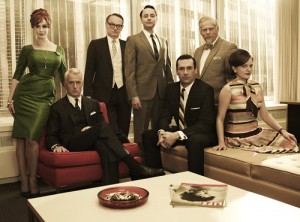TV
‘Mad Men’ Season 7 premiere: ‘Time Zones’
The times, they are a-changin’ on “Mad Men”—but we already knew that. For the past few seasons, we’ve seen Don, Roger and the rest of the old guard struggle to adjust to a society that has less and less need for their brand of hard-drinking, womanizing machismo. Sure, their alpha-male posturing once projected an unmistakable air of authority, but the damage it wrought is beginning to catch up with them. Don’s unemployed for the time being, while his marriage shows signs of strain. Roger’s introduced in a dirty hotel room at the tail end of an orgy with women many years his junior, looking hopelessly lost. Pete’s taken refuge in California after a series of professional and personal embarrassments, smarmy as ever. Things aren’t going to end well for these men, but just how badly they do is still up for question.
Meanwhile, the young guns are on the rise while still battling that nagging sense of discontent that colors everything on the show. Megan’s acting career is taking off, but despite her increasingly fraught relationship with Don, her separation from him has not been painless. And Peggy’s stuck at a firm beset by complacency, her blossoming talent wasted.
Most of this is revealed in the episode’s first 10 minutes, with the remaining 35 left to set the ball rolling ever so slowly. There are still plenty of introductions to be had (Sally, Betty and Bob Benson), but those can wait until next week. “Mad Men” long ago earned the right to coast off a remarkably rich cast of characters, and that’s exactly what it does in “Time Zones,” the first episode of its final season.
This is a show that’s entirely comfortable in its own skin, and what luscious skin it is. It may be something of a cliche by now, but “Mad Men”’s production design is as gorgeous as ever, making the siren song of flashy materialism perpetually, tantalizingly alluring. If we’ve learned anything from “Mad Men,” it’s that money, women and liquor beget more money, women and liquor and a spiritual emptiness that can’t be filled with an award-winning ad campaign. While the show’s early seasons hinted that maybe, just maybe, that promotion or second marriage would allow these characters to find peace, that glimmer of hope is long gone. Creator Matthew Weiner is a master at making the intangible weight of perpetual dissatisfaction all too real, and that weight hangs heavier and heavier as the show nears its end.
Weiner has set these characters on irreversible paths; at this point, we’re simply waiting for the clock to hit midnight. We know Peggy will eventually complete her metamorphosis into Don (without the chronic infidelity) as an enormously talented workaholic destined for solitude. Joan will forever remain underutilized despite her obvious smarts. Roger seems perilously close to collapsing from the strain of a lifestyle he can no longer sustain. But Don remains something of an enigma.
If there’s one thing we can predict with a reasonable amount of certainty, it’s that Don’s going to end up alone. Much as he knows what makes consumers tick, it’s nearly impossible for him to open up outside of the context of advertising, a fact that’s wreaked havoc on every relationship he’s held over the show’s run. Though he’s been able to tackle just about any hurdle with the force of his personality and dogged persistence, the walls appear to be crumbling around him. How far he’ll fall remains to be seen, but we’ve got 13 more episodes to find out.
“We have found ourselves rich in goods but ragged in spirit. Reaching with magnificent precision for the moon but falling into raucous discord on earth.” Towards the end of “Time Zones,” Richard Nixon lays it all out in his inaugural address. This is a show about people who have plenty but want more, who see that eternal happiness frozen in advertisements and believe it’s out there for the right price.
“Time Zones” works primarily to remind viewers of these existential quandaries and to continue the speculation about where one of the bulwarks of TV’s new golden age is going to hang its hat. To quote Nixon once more, “We see around us empty lives, wanting fulfillment.” The question is no longer whether these characters will find that fulfillment but how they’ll respond once they realize it’s out of reach.

